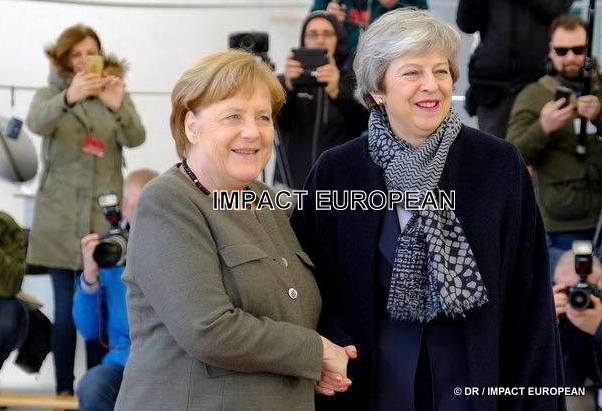British Prime Minister Theresa May has pleaded for Wednesday to get a new Brexit postponement from her European partners.
The scenario of a green light from the EU to a second short report Brexit takes shape, with a likely door open to a longer deadline. But the 27 countries are divided on the conditions to be imposed in London to accept this new setback.
The answer is expected Wednesday at a crucial European summit before which May will outline its plan to 27 countries, which will have to give their unanimous endorsement to any postponement. The challenge is to avoid Friday a brutal exit of the United Kingdom, a « no deal » with potentially devastating economic consequences.
The prolongation beyond April 12 « is neither acquired nor automatic, » insisted Tuesday the French Secretary of State for European Affairs, Amelie de Montchalin, on the sidelines of a meeting with his counterparts to prepare the extraordinary summit convened Wednesday in Brussels.
But no European country should block a new postponement at the summit, because their shared priority is to avoid the scenario of a brutal divorce on April 12, told AFP several diplomatic sources.
Originally scheduled for March 29, the Brexit has already been postponed to Friday, April 12. But for lack of having been able to make adopt by the British deputies the agreement of divorce which it negotiated with Brussels, Mrs May wants to claim a second postponement of the Brexit, until June 30.
German Chancellor Angela Merkel on Tuesday ruled « possible », in front of members of his party, « a postponement until early 2020 » Brexit.
« A Brexit postponement of several months is possible, until early 2020, » said Merkel, according to a participant at a meeting of her conservative party CDU.
Merkel had received the British Prime Minister Theresa May at midday.
A possible postponement, « this is the theme of the summit tomorrow (Wednesday) in Brussels, » said the Chancellor. « The EU does not want to push the British to a disorderly Brexit, it is in Europe’s interest to continue to maintain good relations with Britain, » she said.
Such a date could be agreed by France, for which a period of one year, mentioned in recent days in Brussels, « seems too long, » said the Elysee, where the British prime minister is expected on Tuesday. late afternoon to defend his case with French President Emmanuel Macron.
Faced with Theresa May, Emmanuel Macron should reaffirm that Paris « is not closed to build another solution » that the « no deal », but « with certain limits and not at all costs, » said the Elysee.
European leaders refused in March to grant the British a reprieve until June 30, due to the holding of the European elections from May 23 to 26.
The British government reluctantly announced Monday night that it was launching the organization of the vote, after trying to avoid participation, nearly three years after the referendum in June 2016 that decided the exit of the United Kingdom of the EU.
On Tuesday, the British Prime Minister went to Berlin and then to Paris to convince Merkel and Emmanuel Macron to support his new request to postpone Brexit at the European summit on Wednesday.
Originally scheduled for March 29, the Brexit, for which the British voted by referendum in June 2016, has already been postponed to April 12.
But for lack of having been able to adopt the divorce agreement she negotiated with Brussels by British MPs, Ms. May wants to request a second adjournment, until June 30. The 27 are divided on the conditions to be imposed in London to accept this new deadline.
European Commissioner for Agriculture and Rural Development Phil Hogan briefed the press on Monday on some details of the EU’s « Emergency Plan » for the agri-food sector, in the event of a lack of Brexit.
In the field of agriculture, there will be a lot of disruption if the UK leaves the EU without agreement, said the Commissioner.
These market disturbances would be: customs formalities, safety and health protection controls, logistics, storage of products. The consequences of such a situation will be multiple in particular, delays in delivery, the decline of products, the lack of products on the market.
It must be remembered that most of the EU’s food products exported to the UK are fresh produce (fruit and vegetables) and therefore perishable. The UK depends on imports from the 27 EU states. In case of no agreement, there will be no alternative sources of supply for the United Kingdom.
The measures put in place by the EU to mitigate the negative impact of a hard Brexit on farmers and producers therefore concern public financial interventions, private storage aid and withdrawal schemes.
In addition, the European Commission has recently adopted, according to the Commissioner, a new regulation that allows an increase of state aid up to 66% that can be granted to the agricultural sector.
There are also opportunities for EU member states to propose amendments to their rural development agenda to redirect state support to Brexit-affected beneficiaries, added Phil Hogan.
Among them, the British should notably promise not to disrupt the heavy issues that are looming for the EU in the coming months, such as the development of its budget for the period 2021-2027.
The European Summit to be held on 10 April in Brussels is therefore intended to be decision-making, to better guide the EU’s measures towards Brexit and the future of relations between the United Kingdom and the EU.



Views: 0



More Stories
Meeting at the Élysée between Emmanuel Macron and José Manuel Ramos-Horta
Phenom 300E: The World’s Leading Light Jet for 14 Consecutive Years
Coutures: Angelina Jolie Stuns at the Paris Premiere